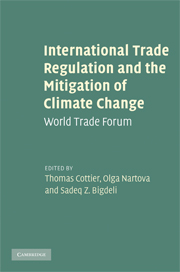Book contents
- Frontmatter
- Contents
- Contributors
- List of figures
- List of tables
- List of abbreviations
- Preface
- PART I Climate change mitigation: scientific, political and international and trade law perspectives
- PART II Climate change mitigation and trade in goods
- 5 How to think about PPMs (and climate change)
- 6 Tilting at conventional WTO wisdom
- 7 Private climate change standards and labelling schemes under the WTO Agreement on Technical Barriers to Trade
- PART III Trade in renewable energy sources
- PART IV Climate change mitigation and trade in services
- PART V Climate change and technology transfer, investment and government procurement: legal issues
- PART VI Institutional challenges and the way forward
- Index
6 - Tilting at conventional WTO wisdom
from PART II - Climate change mitigation and trade in goods
Published online by Cambridge University Press: 04 August 2010
- Frontmatter
- Contents
- Contributors
- List of figures
- List of tables
- List of abbreviations
- Preface
- PART I Climate change mitigation: scientific, political and international and trade law perspectives
- PART II Climate change mitigation and trade in goods
- 5 How to think about PPMs (and climate change)
- 6 Tilting at conventional WTO wisdom
- 7 Private climate change standards and labelling schemes under the WTO Agreement on Technical Barriers to Trade
- PART III Trade in renewable energy sources
- PART IV Climate change mitigation and trade in services
- PART V Climate change and technology transfer, investment and government procurement: legal issues
- PART VI Institutional challenges and the way forward
- Index
Summary
Rebel without a cause?
Contemporary wisdom under the General Agreement on Tariffs and Trade (GATT) holds that physically identical products are ‘like’ for national treatment purposes, regardless of the climate change implications of their process and production methods (PPMs) including CO2 emissions during production. In his paper Professor Regan challenges the prevailing interpretation of World Trade Organization (WTO) law, and holds the truth to be self-evident that all products are not created equal, but are endowed by their creators with certain inalienable characteristics that can render them unlike otherwise identical products. He has further suggested that identical products are not like if treating them differently is justified by some non-protectionist purpose the regulator is pursuing. Professor Regan posits that conventional wisdom on PPMs has no basis in GATT/WTO treaty text and is not settled in jurisprudence. The goal of his paper is to change the mind-set of trade lawyers on this issue.
In terms of WTO law and practice, Professor Regan is calling for nothing less than revolution against the settled view that general GATT rules apply to ‘products as products’ and not to non-product-related PPMs. He raises the alarm that the (extra-systemic) dangers of disallowing PPMs are huge and has suggested that its is hard to think of an area in which trade rules, if enforced to prevent national regulation, could have greater worldwide cost.
- Type
- Chapter
- Information
- International Trade Regulation and the Mitigation of Climate ChangeWorld Trade Forum, pp. 124 - 130Publisher: Cambridge University PressPrint publication year: 2009



